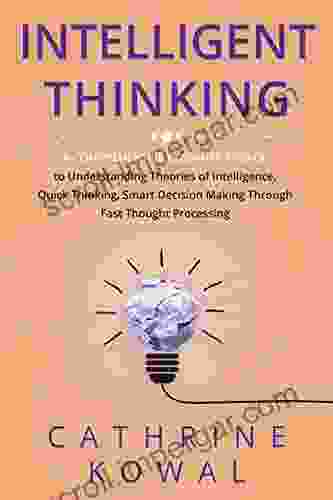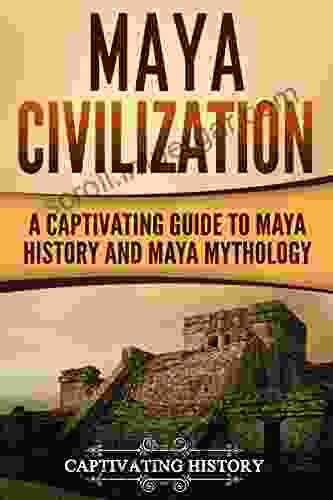Unravel the Secrets of Intelligence: A Comprehensive Guide for Beginners

4.6 out of 5
| Language | : | English |
| File size | : | 1052 KB |
| Text-to-Speech | : | Enabled |
| Screen Reader | : | Supported |
| Enhanced typesetting | : | Enabled |
| Word Wise | : | Enabled |
| Print length | : | 178 pages |
| Lending | : | Enabled |
Do you ever wonder what makes you unique? Why is one person a gifted musician while another excels in mathematics? What drives our abilities and limitations? These questions have captivated thinkers for centuries, leading to the development of fascinating theories that attempt to explain the nature of intelligence.
In this comprehensive beginner's guide, we will embark on an enlightening journey into the realm of intelligence. We will explore the fundamental theories that have shaped our understanding of this complex concept, empowering you with a clear and insightful grasp of intelligence.
Defining Intelligence
Intelligence is a multifaceted and elusive concept that has been defined in various ways. Generally, intelligence refers to our ability to learn, solve problems, adapt to different situations, and acquire and apply knowledge and skills.
One of the earliest definitions of intelligence was proposed by Charles Spearman, who suggested that intelligence is a single, general factor (g) that underlies all cognitive abilities. However, later research has revealed that intelligence is not a unitary construct but rather a complex interplay of multiple factors.
Theories of Intelligence
Over the years, numerous theories have been proposed to explain the structure and nature of intelligence. Some of the most prominent theories include:
Gardner's Theory of Multiple Intelligences
Howard Gardner's theory of multiple intelligences challenges the traditional view of intelligence as a single entity. Gardner argues that there are eight distinct types of intelligence:
- Linguistic intelligence
- Logical-mathematical intelligence
- Spatial intelligence
- Bodily-kinesthetic intelligence
- Musical intelligence
- Interpersonal intelligence
- Intrapersonal intelligence
- Naturalistic intelligence
Gardner believes that each person possesses a unique combination of these intelligences, and that success in life depends on nurturing and developing our strengths.
Sternberg's Triarchic Theory of Intelligence
Robert Sternberg's triarchic theory of intelligence posits that there are three main aspects of intelligence:
- Componential intelligence: This refers to our basic cognitive abilities, such as memory, attention, and problem-solving.
- Experiential intelligence: This involves our ability to learn from experience and apply our knowledge to new situations.
- Contextual intelligence: This refers to our ability to adapt to different contexts and environments.
Sternberg argues that all three aspects of intelligence are essential for success in life.
Cattell-Horn-Carroll (CHC) Theory of Intelligence
The CHC theory of intelligence is a comprehensive framework that encompasses a wide range of cognitive abilities. The theory divides intelligence into two broad categories:
- Fluid intelligence: This refers to our ability to solve novel problems and think abstractly.
- Crystallized intelligence: This involves our accumulated knowledge and skills.
The CHC theory further divides intelligence into numerous subcategories, such as verbal comprehension, perceptual speed, and working memory.
Intelligence Testing
Intelligence testing is a standardized method of measuring cognitive abilities. Intelligence tests are designed to assess a wide range of abilities, including:
- Verbal comprehension
- Perceptual reasoning
- Working memory
- Processing speed
Intelligence tests are typically used in educational settings to identify students who may need additional support or enrichment. They can also be used in workplace settings to assess job candidates.
Emotional Intelligence
In recent years, there has been growing recognition of the importance of emotional intelligence (EI). EI refers to our ability to understand and manage our own emotions, as well as the emotions of others. EI is essential for success in both personal and professional life.
There are five key components of EI:
- Self-awareness
- Self-regulation
- Motivation
- Empathy
- Social skills
Individuals with high EI are better able to navigate social situations, build relationships, and cope with stress.
The study of intelligence is a fascinating and ever-evolving field. By understanding the different theories of intelligence, we gain a deeper appreciation for the complexity of human cognition. This knowledge can empower us to nurture our own intelligence and to create more supportive and inclusive environments for all.
Embark on this journey into the realm of intelligence today and unlock the secrets that shape our minds.
4.6 out of 5
| Language | : | English |
| File size | : | 1052 KB |
| Text-to-Speech | : | Enabled |
| Screen Reader | : | Supported |
| Enhanced typesetting | : | Enabled |
| Word Wise | : | Enabled |
| Print length | : | 178 pages |
| Lending | : | Enabled |
Do you want to contribute by writing guest posts on this blog?
Please contact us and send us a resume of previous articles that you have written.
 Book
Book Novel
Novel Page
Page Chapter
Chapter Text
Text Story
Story Genre
Genre Reader
Reader Library
Library Paperback
Paperback E-book
E-book Magazine
Magazine Newspaper
Newspaper Paragraph
Paragraph Sentence
Sentence Bookmark
Bookmark Shelf
Shelf Glossary
Glossary Bibliography
Bibliography Foreword
Foreword Preface
Preface Synopsis
Synopsis Annotation
Annotation Footnote
Footnote Manuscript
Manuscript Scroll
Scroll Codex
Codex Tome
Tome Bestseller
Bestseller Classics
Classics Library card
Library card Narrative
Narrative Biography
Biography Autobiography
Autobiography Memoir
Memoir Reference
Reference Encyclopedia
Encyclopedia Cathy Caruth
Cathy Caruth Catherine H Zuckert
Catherine H Zuckert Stephen Hunter
Stephen Hunter Casey Tygrett
Casey Tygrett Richard W Sears
Richard W Sears Cemal Kafadar
Cemal Kafadar Cara Frost Sharratt
Cara Frost Sharratt Carolyn Spring
Carolyn Spring Stephen Law
Stephen Law Cameron Stauth
Cameron Stauth Rita E Numerof
Rita E Numerof Carlos A Ball
Carlos A Ball Casper Rigsby
Casper Rigsby Sue Dunderdale
Sue Dunderdale Denis Noble
Denis Noble Wolfgang Giegerich
Wolfgang Giegerich Nubia Morales N
Nubia Morales N Catherine Nixon Cooke
Catherine Nixon Cooke Tarl Warwick
Tarl Warwick Carl Robinson
Carl Robinson
Light bulbAdvertise smarter! Our strategic ad space ensures maximum exposure. Reserve your spot today!

 William PowellThe History and Future of Narragansett Bay: Unraveling the Story of a Coastal...
William PowellThe History and Future of Narragansett Bay: Unraveling the Story of a Coastal... Garrett PowellFollow ·14.6k
Garrett PowellFollow ·14.6k Holden BellFollow ·3.1k
Holden BellFollow ·3.1k Enrique BlairFollow ·17k
Enrique BlairFollow ·17k Robert HeinleinFollow ·18.7k
Robert HeinleinFollow ·18.7k Xavier BellFollow ·18.2k
Xavier BellFollow ·18.2k Haruki MurakamiFollow ·15.5k
Haruki MurakamiFollow ·15.5k Theo CoxFollow ·18.8k
Theo CoxFollow ·18.8k Angelo WardFollow ·14.2k
Angelo WardFollow ·14.2k

 Henry Hayes
Henry HayesVery Short Introductions: A Gateway to Knowledge...
In the realm of academia, where vast oceans of...

 Jean Blair
Jean BlairBorn on the Third of July: An Unforgettable Journey of...
Born on the Third...

 Benjamin Stone
Benjamin StoneEnvironmental Offsets: Striking a Balance between...
In the face of pressing environmental...

 Colin Foster
Colin FosterGirl With Power: My Boyhood Bully Diary
In this gripping and...

 Colin Foster
Colin FosterUnveiling the Unseen: The Collected Works of Charles Fort
Prepare to venture into...

 Gabriel Mistral
Gabriel MistralUnveiling the Hidden World of the English Republican...
Dive into the captivating world of 'The...
4.6 out of 5
| Language | : | English |
| File size | : | 1052 KB |
| Text-to-Speech | : | Enabled |
| Screen Reader | : | Supported |
| Enhanced typesetting | : | Enabled |
| Word Wise | : | Enabled |
| Print length | : | 178 pages |
| Lending | : | Enabled |










